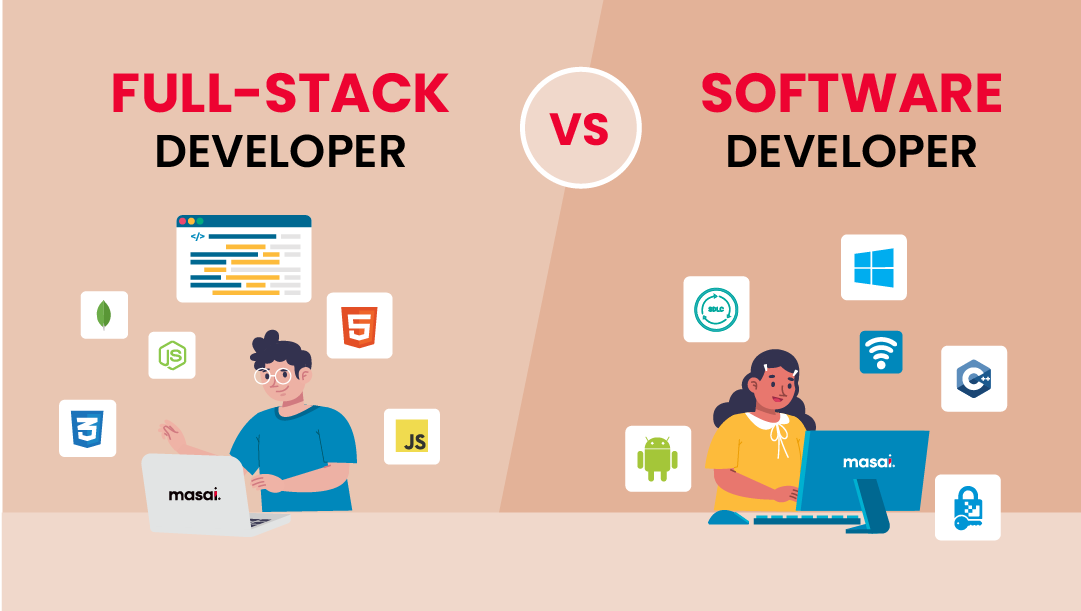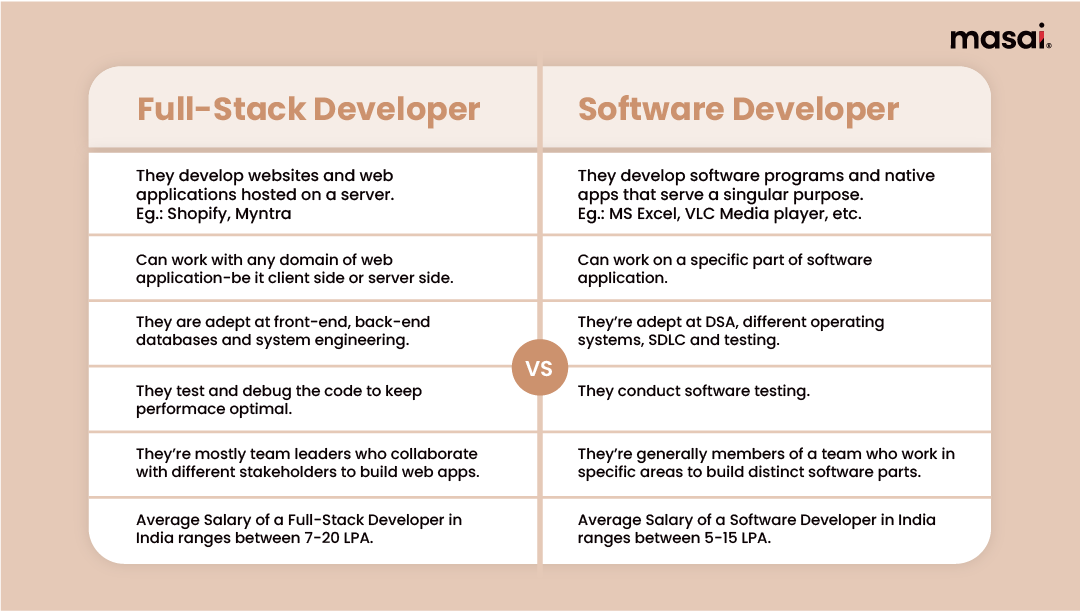Full-Stack Developer vs Software Developer - Key Differences
The realm of development is one filled with creativity and endless potential. Build powerful web applications or design sophisticated programs, choose a career path that’s most intriguing to you, and never look back again!

One of the most frequently asked questions in the tech world today is - Should I become a full-stack developer or a software developer?
While both of these roles are highly demanded, there are certain distinctions that set these career paths apart.
We’ll cover all those differences in this article, along with what projects they work on, what salaries they get, and more.
Table of contents-
Skills of a full-stack developer
Skills of a software developer
Which career path should you choose?
Let’s first understand what do we exactly mean by full-stack developers and software developers-
What is a full-stack developer?
Full-stack developers are people who can work on all the branches of a web application including databases, servers, and clients.
A full-stack developer operates on both the domains of web development - front-end development and back-end development.
By virtue of this, they can develop a whole new website from scratch and can also maintain its functionality.
There are front-end developers and there are back-end developers. And then there are full-stack developers who can be both depending upon the requirement.
As they're responsible for handling both the server-side and client-side development, they're often in charge of the plan of action of the team and keeping track of the progress on both ends.
It might come as a shock but this role didn't even exist a few years ago. Companies had to hire different people to pursue different ends of development.
But over the last few years, there has been an upsurge in the demand given the flexibility and leadership qualities of a full-stack developer. And top tech companies are ready to pay high-end salaries for the role.

What is a software developer?
While a full-stack developer works on web applications, a software developer works on software and native apps that we use in our daily lives.
For example - Facebook is a web application while MS Excel is a software program that runs locally on your computer.
To know the difference between a full-stack developer and a software developer, let's first understand-
Difference between software applications and web applications
Software applications refer to the native desktop applications that we use for a specific purpose. It comprises a set of programs that tells the computer how to work.
They're hosted on your local devices and perform well-defined functions. Some of these applications can be downloaded from an Internet-based app store and some are distributed as an enterprise-level suite of software.
An application software depends on operating systems, and thus there are different versions of the same software for different OS.
For example - MS Excel, MS word, VLC media player, etc.
Web applications refer to a collection of web pages hosted on a server. You need a browser like Chrome or Firefox to access these websites. Web applications are interactive in nature and can handle requests from users.
They're developed for cross-platforms and exist as services that are active over HTTP or HTTPS transfer protocols.
We all know Wikipedia as an online web application containing tons of information. But did you know that Microsoft had launched its own encyclopedia in the form of an application software called Encarta.
It was originally sold on CD-ROM and DVDs. Microsoft discontinued the service mostly because of the competition from free and easily accessible Wikipedia.
Where Encarta had to be compatible with different operating systems, people could easily access Wikipedia whether they were using Windows or Ubuntu.
Software developers work on building the systems. They are well versed in the basics of computer science subjects, operating systems, and multiple programming languages such as Java, Python, C++, C, and many others.
Now, let's look at the difference in their skillsets in detail-
Skills of a full-stack developer
Following are the skill requirements to be a full-stack developer -
- Front-end - Good hold on multiple front-end languages and libraries - HTML/CSS, JavaScript, and XML.
- Back-end - Knowledge of back-end languages such as PHP, Ruby, C#, Java, and Python.
- Databases - Good experience with databases such as MySQL, NoSQL, MongoDB, etc.
- DSA - Good hold on data structures and algorithms. Though, it's not one of the first requirements, having a stronghold on DSA certainly makes for a complete full-stack developer.
- HTTP/HTTPS and REST - While HTTP/HTTPS eases communications between servers and clients, REST API takes up the role of the translator between the front-end and the back-end. As full-stack web development deals with server-hosted applications, they have to master both skills.
Skills of a software developer
- DSA - One can be a good software developer if one knows how to store and organize data and how it can be used to solve real-life problems. Thus, having knowledge of DSA is a must.
- Programming languages - They need to be adept at multiple programming languages like Java, Python, C++, C, and others, as mentioned earlier
- Operating systems - Every software developer should have the foundational knowledge of operating systems' mechanisms. While creating a desktop project, they can face several issues like memory overflow, tools conflicting issues, communication issues with other machines, and so on. It's gospel to know how operating systems work.
- SDLC - They also need to have an understanding of the software development life cycle (SDLC) and its phases.
- Testing - A software developer should have experience with at least three different testing methods namely - Unit Testing, Integration Testing, and System Testing. Before handing over the software to the client, they must ensure there are no bugs and errors.
- Encryption and Cryptography - Not the last and certainly not the least! As they build software that has access to user information in most cases, they need to be able to implement a secure key to avoid attacks. They must have a knowledge of how encryption and cryptography work.
Besides these technical skills, both full-stack and software developers need to have other soft skills to sustain in a competitive environment. Communication skills, management skills, leadership, and empathy go a long way in propelling a developer's career.
FSD projects vs SD projects
As we know, full-stack developers work across the entire stack, there are numerous responsibilities they have to uphold, some of which are -
- Testing and debugging the code to keep the performance optimal
- Collaborating with the design team and turning their ideas into reality through code
- Creating and maintaining servers and databases for the back-end of the web application
- They are also responsible for developing APIs and, working with version control systems, and third-party apps
- Transforming business objectives into finished products from concept to execution
- Leading a team of developers and network managers to ensure efficient output
- Ensuring cross-platform compatibility and fixing production phase issues
Now, here are a few core responsibilities that software developers undertake -
- Development, testing, and implementation of new software programs
- Designing and updating software database
- Facilitating root cause analysis of operating system issues
- Conducting software testing including unit testing, system testing, and acceptance testing
- Integrating software components and third-party programs
Full-Stack Developer vs Software Developer Salaries
According to LinkedIn's 2020 Top Emerging Jobs report, full-stack developers were ranked number 4 on the list, for obvious reasons, we must say.
Given their diverse skillsets and leadership qualities, top tech companies and startups alike are ready to pay lucrative salaries.
In India, a full-stack developer earns somewhere between INR 7 to 20 LPA.
On the other hand, software developers are mostly responsible for a specific aspect of an application. They ensure the proper functioning of the native apps and work in teams to meet the IT requirements of companies.
According to Glassdoor, the national average salary of a software developer/engineer was INR 7,10,000 in June 2022.
However, companies like Amazon and Oracle can also offer north of INR 10 LPA.
Both these careers are in high demand and will continue to be so in the upcoming years.
There have been talks about low code and no code taking over developers’ demand, but they’re just myths concocted by a select few.
Which career path should you choose?
Before moving ahead, let's summarize what we've learned till now-

Without a doubt, both these jobs are in-demand, growth-oriented, and fascinating.
So, which one to choose?
There are advantages and disadvantages in each field. It depends on your calling - we'd say! What excites you more? - Building powerful web applications or designing sophisticated programs?
While a full-stack developer is a jack of all trades, software developers work on more concentrated, narrower aspects of technology making them the masters of one.
Where major companies hire software developers/engineers, full-stack developers can become technical partners for booming startups.
And since both these roles are strongly interconnected, you can dabble between the two without much hassle.
So, make a decision based on your interests.
Emerging Technologies, Specializations, Collaboration, and Tools: The Evolving Landscape of Development
In the ever-evolving world of technology, both full-stack developers and software developers must keep a watchful eye on emerging trends and continuously adapt to stay competitive in their careers. Beyond the foundational skills, staying updated with the latest technologies and methodologies is crucial. Let's explore how this impacts your career choice, as well as the essential role of collaboration and the tools used in these roles.
1. Emerging Technologies and Specializations
Software developers and full-stack developers are required to stay current with technology. The routes they select to specialize in, though, might vary greatly.
Developers who work across the whole stack frequently concentrate on a variety of methods, enabling them to manage both the front end as well as the back end of a project. Despite the fact that their variety is a strength, they must also be flexible and quick students, especially given the rapid rate of technological progress. For example, they could have to deal with server-side applications like Node.js or Python's Flask while developing the front-end using frameworks that use JavaScript like React or Vue.
On the other side, software engineers could decide to focus on a specific field like cybersecurity, blockchain, or artificial intelligence. These specializations need a better comprehension of specialized trends and technology, which may open up lucrative job prospects in certain fields.
2. Collaboration and Communication Skills
Both full-stack and software developers, regardless of their chosen specialization, need strong collaboration and communication skills. In today's workplace, software development is rarely a solitary endeavor. Projects often involve cross-functional teams, including designers, product managers, quality assurance testers, and more.
Effective communication is vital to convey ideas, gather requirements, and ensure everyone is aligned toward the same goals. Whether you're explaining the technical aspects of a project to non-technical stakeholders or collaborating with team members from different backgrounds, clear communication is key.
Additionally, collaboration skills are essential for brainstorming solutions, resolving conflicts, and working harmoniously within a team. Agile methodologies like Scrum and Kanban have become standard in software development, emphasizing regular team interactions and adaptability.
3. Tools and Frameworks
Whether you decide to become a software developer or a full-stack developer, the frameworks and tools that you may use will differ.
The usual technological stack used by full-stack engineers consists of front-end frameworks like React, Angular, or Vue.js, back-end frameworks like Express.js, Django, or Ruby on Rails, and databases like MySQL, MongoDB, or PostgreSQL. The benefit in this situation is the ability to seamlessly handle both project ends, but it also requires juggling a range of tools and technology.
Conversely, software engineers could go further into certain frameworks and technologies pertinent to their chosen specialization. For instance, an AI-focused software engineer may spend a lot of time working with TensorFlow or PyTorch, while a cybersecurity expert might need to understand Wireshark or Metasploit.
Getting Started
Becoming a full-stack developer is the perfect gateway to the huge world of software engineering. You will be well-versed with the ins and outs of almost every facet of development.
Now, let us ask you something - Why did you browse this topic?
As far as we can guess - Either you're a budding programmer looking to build a career or you're a beginner with no knowledge of software development.
Whatever the case be, you've arrived at the right place!
These pay-after-placement-based courses in web development and data analytics are a sure-set way to launch your career in the software industry. You get to learn everything from scratch so, it doesn't really matter if you're from a non-tech background. 19-year-old 12th pass-outs have gotten placed as full-stack developers in major companies after the program.
Be sure to check the revolutionary ISA fee structure before you make a decision.
Cheers!

